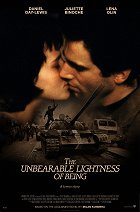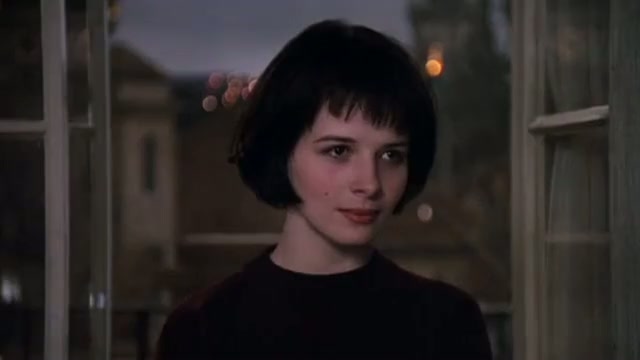Directed by:
Philip KaufmanCinematography:
Sven NykvistComposer:
Mark AdlerCast:
Daniel Day-Lewis, Juliette Binoche, Lena Olin, Derek de Lint, Erland Josephson, Pavel Landovský, Donald Moffat, Daniel Olbrychski, Stellan Skarsgård (more)VOD (2)
Plots(1)
Tomas is a doctor and a lady-killer in 1960s Czechoslovakia, an apolitical man who is struck with love for the bookish country girl Tereza; his more sophisticated sometime lover Sabina eventually accepts their relationship and the two women form an electric friendship. The three are caught up in the events of the Prague Spring (1968), until the Soviet tanks crush the non-violent rebels; their illusions are shattered and their lives change forever. (official distributor synopsis)
(more)Reviews (3)
I must admit that I only gave this that one star to reward that the authors attempted to create the perfect Prague atmosphere, but those cameras that filmed it haven’t even brushed up against Prague. Those Czech signs and the spirit of Czech streets is just not enough to turn the set into Czech Republic. That’s simply not possible. Everything else was wrong and the worst thing about it was the fact that it was awful, truly awful three hours of boredom.
()
Basically a perfect example of the current development of Kundera's myth. From a complex and dense text to a sparse and twisted story that is styled to be "user friendly" for Western audiences. The absolute artificiality of the environment wouldn’t be as important if the atmosphere just before / after August didn’t play such an important role in the original. Kaufman evokes the atmosphere like someone who is uninitiated in the classics – he inserts the emblems of Czechness everywhere – the flag, the anthem, Prague Castle, but a simple a glance reveals that in reality everything is artificial, misunderstood, twisted. The highlight is the end of the film, when the Czech countryside is depicted with unwanted irony in the same way as in Sorel paintings from the 1950s. Another problem (at least for me) is the acting, especially the lousy performance by Daniel Day-Lewis, whose character Tomáš completely lacks any of the internal tension from the literary texts and suffices with one seductive look, whilst fatigue, skepticism and internal exile disappear somewhere. Thirdly, the screenplay, unlike the balanced and masterfully styled original masterpiece, gets stuck on considerable inconsistencies in everyday speech and deeper thoughts. As a result, it comes off as extraordinarily pathetic and inorganic. Several well-filmed moments deserve praise (I would especially highlight the photography of Sabina's nudes and then the impressively edited conclusion with its great sound), which, however, did not convince me that Kaufman made a cohesive film worthy of Kundera's novel. If it weren't for the original novel, I would probably be more lenient, but this film simply wasn’t very good.
()
Unstoppable colossus, which hides a simple and at the same time too protracted story under its richness of thought, which is furthermore not adapted in the true sense of the word, rather experimental. I would have understood the central idea halfway through, and when, after an hour and a half, the script tries to extract the last remnants of emotions from me through moving music, long glances, and bold gestures, I was just sitting there, feeling exhausted to the core. I haven't met Kundera yet, and the film doesn't change anything about that.
()

